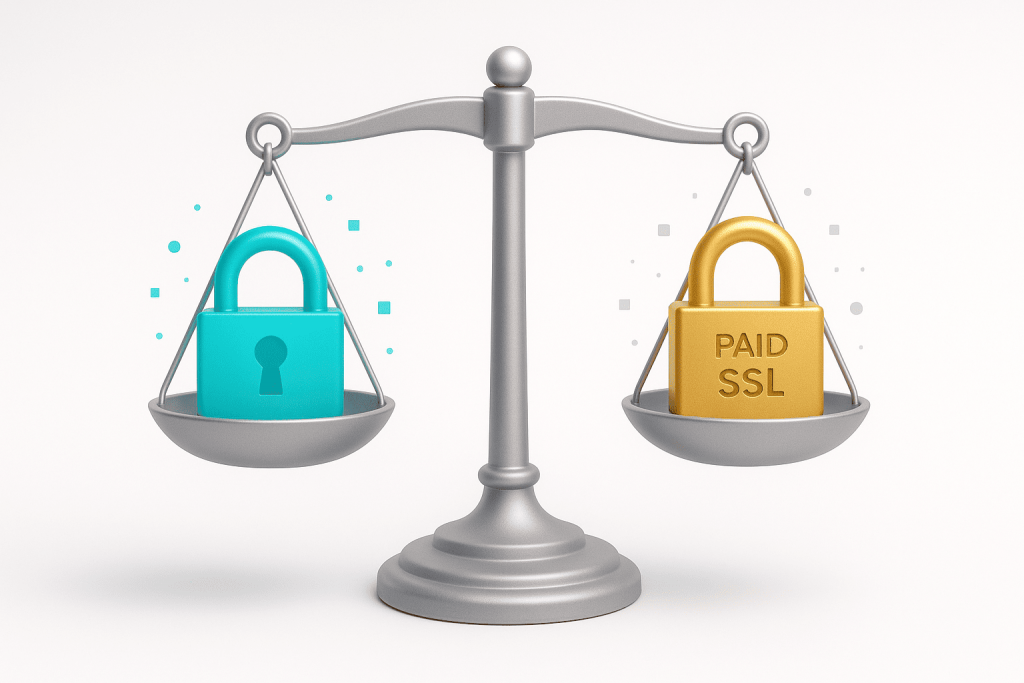
In today’s digital world, protecting user data has become not just good practice, but a mandatory requirement for any website. Search engines and browsers are increasingly strict with resources that lack a secure connection, marking them as unsafe. An SSL certificate provides this protection, and today website owners can choose between free solutions like Let’s Encrypt and commercial (paid) certificates from reputable certification authorities.
In this article, we’ll take a detailed look at the differences between these options, analyze their pros and cons, and provide recommendations on when you should choose a free certificate and when it’s worth investing in a paid one.
What Is SSL and Why It’s Critical
SSL (Secure Sockets Layer) is an encryption technology that creates a secure channel between a user’s browser and the web server. When a site runs over HTTPS, all data — from logins and passwords to banking details — is transmitted in encrypted form, preventing it from being intercepted or altered during transfer.
Main reasons to install SSL:
- Data privacy protection — especially important for sites collecting personal or payment data.
- User trust — the padlock icon in the browser increases visitor confidence.
- SEO advantage — Google has officially confirmed that HTTPS is a ranking factor.
- Compliance with payment system requirements — without SSL, you cannot process online payments.
Let’s Encrypt: What the Free Service Offers
Let’s Encrypt is a non-profit certification authority that issues free DV (Domain Validation) certificates. Their primary purpose is to confirm that you control a domain and provide basic encryption.
Advantages of Let’s Encrypt:
- Completely free — ideal for small sites and startups.
- Quick installation — a certificate can be issued and installed within minutes.
- Automatic renewal — valid for 90 days, but can be set to renew automatically.
- Wide support — integrated into many hosting panels and server solutions.
Disadvantages:
- DV validation only — does not verify a legal entity or brand, which may lower trust for commercial resources.
- No insurance or warranty — there’s no compensation if the certificate is compromised.
- Frequent renewal — without automation, you can miss the expiration date and lose the secure connection.
Paid SSL Certificates: Enhanced Security and Reputation
Paid SSL certificates are issued by well-known certification authorities (Comodo, DigiCert, Sectigo, GlobalSign, etc.) and offer more than just encryption.
Advantages:
- Different validation levels:
- DV — domain validation.
- OV (Organization Validation) — organization verification with the company’s details displayed in the certificate.
- EV (Extended Validation) — extended verification with the company name displayed next to the site address.
- DV — domain validation.
- Warranty and insurance — compensation in case of a security breach (amounts can reach hundreds of thousands of dollars).
- Flexibility for large projects — support for subdomains (Wildcard) and multi-domain certificates.
- Increased trust — especially for online stores and financial services.
Disadvantages:
- Cost — depends on the level of verification and the certification authority’s brand.
- Longer issuance process — especially for EV, where document verification and confirmation calls are required.
Let’s Encrypt vs Paid SSL: Comparison
| Criterion | Let’s Encrypt | Paid SSL |
| Price | Free | From a few dollars to hundreds per year |
| Validation level | DV | DV, OV, EV |
| Insurance | No | Yes (from $10,000 to $1,500,000) |
| Validity period | 90 days | 1–2 years |
| Automatic renewal | Yes | Possible, depending on provider |
| Subdomain support | Limited | Available in Wildcard and multi-domain |
When to Choose Let’s Encrypt
- Personal blog or portfolio — when no sensitive data is collected.
- Testing environments — temporary projects during development.
- Early-stage startup — helps save money at launch.
- Small corporate brochure site — if the main goal is simply to have HTTPS.
When to Pay for SSL
- Online stores and e-commerce — protecting payment transactions and customer personal data.
- Banking and financial services — compliance with security standards.
- International corporations — working with multiple domains and subdomains.
- Businesses requiring higher trust — legal verification and brand display in the browser.
- Projects with contractual obligations — when partners require a certificate with warranty.
Practical Tips for Choosing SSL
- If you have a simple site without commercial activity — start with Let’s Encrypt.
- If you plan to launch an online store or financial service — consider a paid SSL certificate with OV or EV.
- If you have multiple subdomains — choose a Wildcard SSL.
- For projects with highly sensitive data — opt for certificates with maximum insurance and a long validity period.
Conclusion
Both options are valid: Let’s Encrypt is perfect for basic needs, while paid SSL certificates are for businesses where reputation, warranty, and additional features are important. The key is to focus not only on cost but also on your project’s security requirements.
To ensure reliable protection, choose an SSL certificate from a trusted provider. And if you’re looking for high-performance and secure hosting, consider VPS or dedicated server rental from RX-NAME, which will provide stability and control over your project.

Leave a Reply